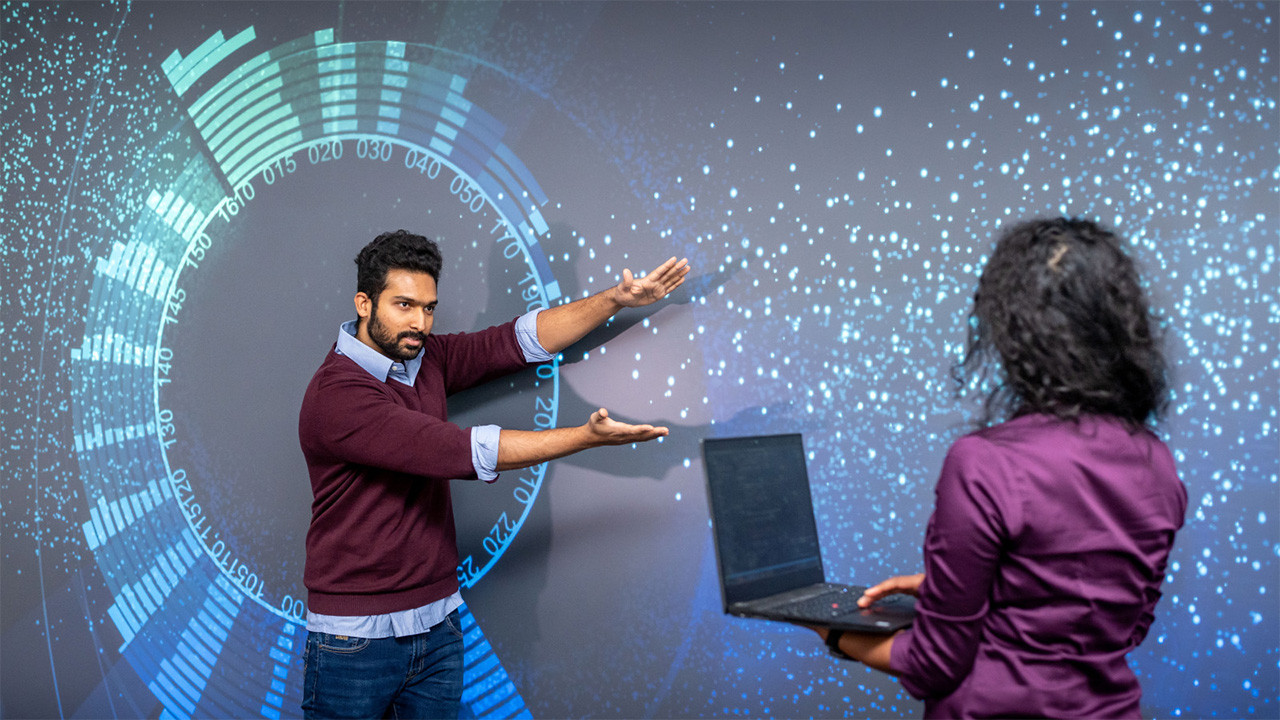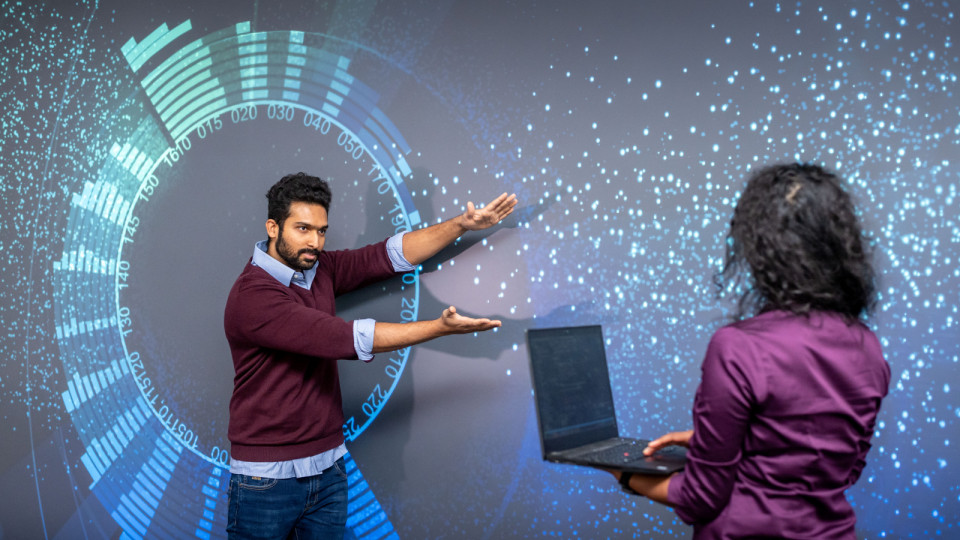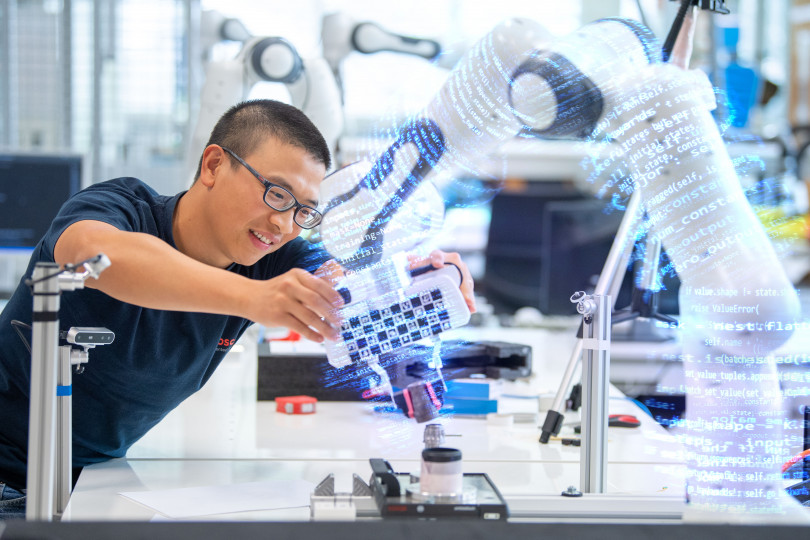Stuttgart, Germany – Bosch continues to set the pace in the use of artificial intelligence: in the past five years, the company has filed patent applications for more than 1,000 AI inventions, making it one of the leading applicants for AI patents in Europe. Recent technological developments in the area of generative AI and what are known as foundation models (such as ChatGPT) also offer Bosch entirely new opportunities. These models are able to generate content such as software code, text, images, and music. What makes them especially powerful compared to previous AI models is that they are trained on vast amounts of data. This breadth and volume of information allows foundation models to translate between languages, for example, and to work through tasks in a structured way. “Technological breakthroughs are opening a whole new chapter in the area of AI,” says Tanja Rückert, member of the board of management and chief digital officer of Robert Bosch GmbH. “This progress will influence almost all areas of society as well as processes in companies. We want to exploit this potential for Bosch – both for our customers and for our associates.”
That is why Bosch currently has AI experts from both research and the divisions looking into the specific applications that these new AI models offer the company. One example is the company’s own database, which stores entries according to search terms. The less precise the keyword searched for, the less accurate the search result and vice versa. A solution based on generative AI would search – and find – information much faster and, most importantly, more comprehensively. This would enable easier access to and more thorough use of knowledge that already exists within the company. AI-powered search is one of some 60 potential use cases around foundation models that are currently being reviewed and that the company plans to implement if the evaluation is positive.
Bosch brings AI into applications faster than originally planned
“In recent years, Bosch has made good progress in the development of AI in its divisions and at its locations worldwide,” Rückert says. “We are bringing AI into our applications quickly and successfully. We’re making good progress here.” Before the end of this year, all products and solutions are set to either contain AI or have been developed or manufactured with its help. The company originally set this goal for 2025, but is now on track to achieve it two years early. This is thanks also to more than 300 AI researchers who are currently working on the development of new AI methods at Bosch. There is close contact between research and the divisions on this. In addition, the company is pursuing customized HR and training policies: in 2019, an AI training program was launched under the leadership of Bosch research. To date, 26,500 associates have completed this program, which includes training formats at three different levels for managers, engineers, and AI users. “The training courses play an important role in bringing AI expertise into all areas of the company,” says Thomas Kropf, the head of Bosch research. Bosch has also established strong partnerships with leading global institutions, such as the renowned Carnegie Mellon University in the United States, and has continuously expanded its patent portfolio in the field of artificial intelligence over the years.
A billion in sales of artificial intelligence
AI has been a driver of progress and growth for some time. According to PWC, Germany’s GDP could increase by 11 percent by 2030. Tractica projects global sales to rise to around 31 billion dollars in 2025. The main reasons are considered to be the greater productivity and efficiency that AI solutions make possible. Over the next few years, Bosch, too, wants its sales of AI-enabled products to reach the one-billion-euro mark. “We regard artificial intelligence, in combination with product connectivity, as a key technology and a driver of progress in our society. Our primary aim is for AI to benefit people,” Rückert says.
Bosch is focused on industrial AI, in other words intelligent algorithms combined with domain expertise in transportation, manufacturing, and buildings. The company is applying its own strengths in the manufacturing of complex, physical objects and combining these with its many years of experience in the area of AI. This is in contrast to U.S. and Chinese IT companies, which are using AI primarily to build a model of humans and their behavior. The potential applications of AI-based solutions are manifold: in chip manufacturing, for example, AI helps detect anomalies. AI-based image processing allows automated optical inspection of wafers. At the same time, AI manages material flows so as to achieve optimum utilization of wafer production machinery. AI technologies are also key to making the new wafer fab in Dresden the world’s most efficient semiconductor plant. Smart cameras and sensors help detect fires at an early stage, while in cars, intelligent assistance systems help prevent accidents.
Artificial intelligence developments and collaborations in Hungary too
Artificial intelligence-based developments are also one of the focus areas of the Bosch Group's operations in Hungary. The company's Hungarian sites also use this technology in a number of areas, the most important of which is in manufacturing processes, such as data analysis for production optimisation, optical control of certain processes or planning of maintenance of production line equipment. Artificial intelligence also plays a prominent role in Bosch's wide-range educational collaborations, including the Bosch-BME Competence Center for Innovative Vehicle Technologies and the ELTE-Bosch Artificial Intelligence Industrial Department, but AI technology is also an integral part of the cooperation with the Budapest Business School (BGE) and the University of Miskolc.
Mónika Hack
+36 70 510 5516
The Bosch Group is a leading global supplier of technology and services. It employs roughly 421,000 associates worldwide (as of December 31, 2022). The company generated sales of 88.2 billion euros in 2022. Its operations are divided into four business sectors: Mobility Solutions, Industrial Technology, Consumer Goods, and Energy and Building Technology. As a leading IoT provider, Bosch offers innovative solutions for smart homes, Industry 4.0, and connected mobility. Bosch is pursuing a vision of mobility that is sustainable, safe, and exciting. It uses its expertise in sensor technology, software, and services, as well as its own IoT cloud, to offer its customers connected, cross-domain solutions from a single source. The Bosch Group’s strategic objective is to facilitate connected living with products and solutions that either contain artificial intelligence (AI) or have been developed or manufactured with its help. Bosch improves quality of life worldwide with products and services that are innovative and spark enthusiasm. In short, Bosch creates technology that is “Invented for life.” The Bosch Group comprises Robert Bosch GmbH and its roughly 470 subsidiary and regional companies in over 60 countries. Including sales and service partners, Bosch’s global manufacturing, engineering, and sales network covers nearly every country in the world. With its more than 400 locations worldwide, the Bosch Group has been carbon neutral since the first quarter of 2020. The basis for the company’s future growth is its innovative strength. At 136 locations across the globe, Bosch employs some 85,500 associates in research and development, of which nearly 44,000 are software engineers.
The company was set up in Stuttgart in 1886 by Robert Bosch (1861–1942) as “Workshop for Precision Mechanics and Electrical Engineering.” The special ownership structure of Robert Bosch GmbH guarantees the entrepreneurial freedom of the Bosch Group, making it possible for the company to plan over the long term and to undertake significant upfront investments in the safeguarding of its future. Ninety-four percent of the share capital of Robert Bosch GmbH is held by Robert Bosch Stiftung GmbH, a charitable foundation. The remaining shares are held by Robert Bosch GmbH and by a corporation owned by the Bosch family. The majority of voting rights are held by Robert Bosch Industrietreuhand KG, an industrial trust. The entrepreneurial ownership functions are carried out by the trust.
Additional information is available online at www.bosch.hu, iot.boschblog.hu, www.bosch.com, www.iot.bosch.com, www.bosch-press.com, www.twitter.com/BoschPresse





